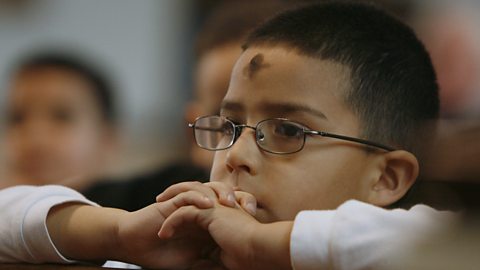Other Christian festivals
Lent
Lent is the period of 40 days (excluding Sundays) that stretches from Ash WednesdayThe first day of the Christian period of Lent. A special day for prayer and fasting. to Easter SundayFor Christians, the day on which Jesus rose from the dead.. It is associated with the time Jesus spent in the wilderness when he fasted for 40 days and nights and was tempted by the Devil.
Traditionally, Christians used to fastTo abstain from all food and drink, typically as a religious observance. during Lent, eating just a small amount of very simple food. Today, the majority of Christians are more relaxed about observing Lent as a fast, but it is still an important part of the Christian year.
Many Christians will take part in all or some of the following during Lent:
- Prayer â Many churches will hold extra services during Lent when people can pray together. Others may choose to spend more time in individual prayer and meditation. In both cases the main type of prayer will be confession.
- Bible study â Some churches may hold Bible study groups in each otherâs homes during Lent. Some Christians may spend more time than usual reading the Bible on their own.
- Fasting â Nowadays many Christians will not fast strictly for Lent, but they may decide to deny themselves by giving up treats or luxuries.
- Good works - Some families will have a Lent box in the house. This is a small moneybox where they place money saved by not having luxuries. The money is used to help Christian projects in the developing world. Some Christians will also sacrifice their time during Lent, perhaps to be involved with charity work.
Shrove Tuesday
This is the day before Lent begins. In the Middle AgesFrom approximately 500 - 1350 AD, sometimes called medieval times., Christians would go to church on this day to be âÈÙ³ó°ù¾±±¹±ð²Ôâ - meaning to receive forgiveness for the sins they confessed. This is the origin of the name âShrove Tuesdayâ. This day is also known as âPancake Tuesdayâ. In order to get ready for the traditional fast of Lent it was necessary to use up all the forbidden ingredients in the house, such as eggs and milk. It was a last chance for people to enjoy themselves before the solemn period of Lent. In Britain and Ireland it is traditional to make pancakes, but in other parts of the world it is a day of carnivals and parties.
Ash Wednesday
This is the first day of Lent. In the Roman Catholic Church and some protestant Churches (including the Church of Ireland) a special service takes place during which worshippers confess their sins and are âsigned with ashesâ. This means that the priest marks the sign of the cross on a personâs forehead using ashes. This is a public way for a person to show they are sorry for their sins and intend to live a good Christian life in the future. The ashes are made by burning the small palm crosses used at the previous yearâs Palm SundayFor Christians, the Sunday before Easter, the first day of Holy Week, when they recall the triumphal entry of Jesus into Jerusalem. service.

Motherâs day
This is the fourth Sunday in Lent. In some churches this was traditionally a time for Christians to return to their âm´Ç³Ù³ó±ð°ùâ â ie the church where they were baptised. More recently, Motherâs Day is a special time for people to show their appreciation to their mothers.